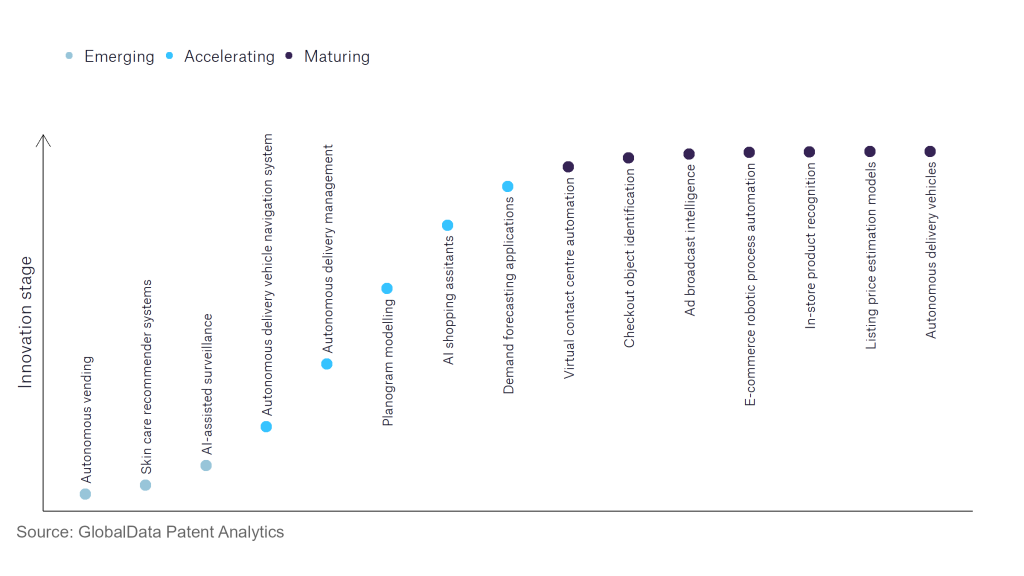The retail industry continues to be a hotbed of innovation, with activity driven by desire for convenience and efficiency, and the growing importance of technologies such as artificial intelligence, cloud, and planogram modelling. In the last three years alone, there have been over 133,000 patents filed and granted in the retail industry, according to GlobalData’s report on Artificial Intelligence in Retail: Planogram modelling. Buy the report here.
However, not all innovations are equal and nor do they follow a constant upward trend. Instead, their evolution takes the form of an S-shaped curve that reflects their typical lifecycle from early emergence to accelerating adoption, before finally stabilising and reaching maturity.
Identifying where a particular innovation is on this journey, especially those that are in the emerging and accelerating stages, is essential for understanding their current level of adoption and the likely future trajectory and impact they will have.
70+ innovations will shape the retail industry
According to GlobalData’s Technology Foresights, which plots the S-curve for the retail industry using innovation intensity models built on over 128,000 patents, there are 70+ innovation areas that will shape the future of the industry.
Within the emerging innovation stage, autonomous vending and AI-assisted surveillance are disruptive technologies that are in the early stages of application and should be tracked closely. Autonomous delivery vehicle navigation systems, autonomous delivery management, and planogram modelling are some of the accelerating innovation areas, where adoption has been steadily increasing. Among maturing innovation areas are virtual contact centre automation and checkout object identification, which are now well established in the industry.
Innovation S-curve for artificial intelligence in the retail industry

Planogram modelling is a key innovation area in artificial intelligence
A planogram can be defined as a schematic tool that is employed in planning a retail store layout. Planograms focus on product displays and placement, along with point-of-sale locations. It can be a diagram or a model. Planograms are used by retailers to make their store operations more efficient.
GlobalData’s analysis also uncovers the companies at the forefront of each innovation area and assesses the potential reach and impact of their patenting activity across different applications and geographies. According to GlobalData, there are 20+ companies, spanning technology vendors, established retail companies, and up-and-coming start-ups engaged in the development and application of planogram modelling.
Key players in planogram modelling – a disruptive innovation in the retail industry
‘Application diversity’ measures the number of different applications identified for each relevant patent and broadly splits companies into either ‘niche’ or ‘diversified’ innovators.
‘Geographic reach’ refers to the number of different countries each relevant patent is registered in and reflects the breadth of geographic application intended, ranging from ‘global’ to ‘local’.
Patent volumes related to planogram modelling
| Company | Total patents (2021 - 2023) | Premium intelligence on the world's largest companies |
| Walmart | 122 | Unlock Company Profile |
| Nuro | 113 | Unlock Company Profile |
| Alphabet | 59 | Unlock Company Profile |
| Toyota Motor | 41 | Unlock Company Profile |
| FedEx | 33 | Unlock Company Profile |
| Locus Robotics | 16 | Unlock Company Profile |
| Zume | 16 | Unlock Company Profile |
| Sycamore Partners | 11 | Unlock Company Profile |
| Emerging Automotive | 11 | Unlock Company Profile |
| Trax Technology Solutions | 10 | Unlock Company Profile |
| iRobot | 9 | Unlock Company Profile |
| Mitsubishi Electric | 8 | Unlock Company Profile |
| Panasonic | 7 | Unlock Company Profile |
| LG | 6 | Unlock Company Profile |
| Honda Motor | 6 | Unlock Company Profile |
| Sony Group | 6 | Unlock Company Profile |
| Denso | 6 | Unlock Company Profile |
| State Farm Mutual Automobile Insurance | 5 | Unlock Company Profile |
| Uber Technologies | 5 | Unlock Company Profile |
| Aptiv | 5 | Unlock Company Profile |
| Intellectual Ventures Management | 5 | Unlock Company Profile |
Source: GlobalData Patent Analytics
Leading players in artificial intelligence-powered planogram modelling space in terms of patents filed are Walmart, Nuro, Alphabet, Toyota Motor, FedEx, and Locus Robotics. In November 2020, Walmart Canada announced the expansion of its partnership with Focal Systems, a company that installs shelf cameras in stores to enable automatic detection of out-of-stock items and planogram compliance. Planogram compliance helps better operational efficiency and on-shelf availability.
Leading players in this space in terms of application diversity are Emerging Automotive, Trax Technology Solutions, State Farm Mutual Automobile Insurance, and Zume.
Leading players in this space in terms of geographic reach are Alphabet, Locus Robotics, Denso, and Sony Group.
Better planning of retail shelves helps retailers in cutting their costs and increasing profits. As a result, planogram modelling will be more in demand in the near future, when high inflation and recession fears will push retailers to cut their costs.
To further understand the key themes and technologies disrupting the retail industry, access GlobalData’s latest thematic research report on Artificial Intelligence in Retail.
Data Insights
From

The gold standard of business intelligence.
Blending expert knowledge with cutting-edge technology, GlobalData’s unrivalled proprietary data will enable you to decode what’s happening in your market. You can make better informed decisions and gain a future-proof advantage over your competitors.



